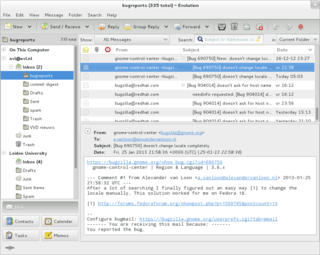
AOL is an American web portal and online service provider based in New York City, and a brand marketed by Yahoo! Inc.

Email is a method of transmitting and receiving messages using electronic devices. It was conceived in the late–20th century as the digital version of, or counterpart to, mail. Email is a ubiquitous and very widely used communication medium; in current use, an email address is often treated as a basic and necessary part of many processes in business, commerce, government, education, entertainment, and other spheres of daily life in most countries.

The history of the Internet has its origin in the efforts of scientists and engineers to build and interconnect computer networks. The Internet Protocol Suite, the set of rules used to communicate between networks and devices on the Internet, arose from research and development in the United States and involved international collaboration, particularly with researchers in the United Kingdom and France.

The Internet is the global system of interconnected computer networks that uses the Internet protocol suite (TCP/IP) to communicate between networks and devices. It is a network of networks that consists of private, public, academic, business, and government networks of local to global scope, linked by a broad array of electronic, wireless, and optical networking technologies. The Internet carries a vast range of information resources and services, such as the interlinked hypertext documents and applications of the World Wide Web (WWW), electronic mail, telephony, and file sharing.
The Simple Mail Transfer Protocol (SMTP) is an Internet standard communication protocol for electronic mail transmission. Mail servers and other message transfer agents use SMTP to send and receive mail messages. User-level email clients typically use SMTP only for sending messages to a mail server for relaying, and typically submit outgoing email to the mail server on port 587 or 465 per RFC 8314. For retrieving messages, IMAP is standard, but proprietary servers also often implement proprietary protocols, e.g., Exchange ActiveSync.

An email client, email reader or, more formally, message user agent (MUA) or mail user agent is a computer program used to access and manage a user's email.

Webmail is an email service that can be accessed using a standard web browser. It contrasts with email service accessible through a specialised email client software. Additionally, many internet service providers (ISP) provide webmail as part of their internet service package. Similarly, some web hosting providers also provide webmail as a part of their hosting package.

CompuServe, Inc. was an American online service, the first major commercial one in the world. It opened in 1969 as a timesharing and remote access service marketed to corporations. After a successful 1979 venture selling otherwise under-utilized after-hours time to Radio Shack customers, the system was opened to the public, roughly the same time as The Source.

An Internet service provider (ISP) is an organization that provides myriad services related to accessing, using, managing, or participating in the Internet. ISPs can be organized in various forms, such as commercial, community-owned, non-profit, or otherwise privately owned.

XS4ALL was an Internet service provider (ISP) in the Netherlands. It was founded in 1993 as an offshoot of the hackers club Hack-Tic by Felipe Rodriquez, Rop Gonggrijp, Paul Jongsma and Cor Bosman, while based in Amsterdam. It was the sixth provider in the Netherlands and the second company to offer Internet access to private individuals. Initially only offering dial-in services via modem and ISDN, it later expanded to offer dial-up access as well as ADSL, VDSL, and fiber-optic (FTTH) services as well as mobile internet. The name is a play on the English pronunciation of access for all.

The Minitel, officially known as TELETEL, was an interactive videotex online service accessible through telephone lines. It was the world's first and most successful mass-market online service prior to the World Wide Web. It was developed in Cesson-Sévigné, Brittany by government-owned France Télécom.
An online service provider (OSP) can, for example, be an Internet service provider, an email provider, a news provider (press), an entertainment provider, a search engine, an e-commerce site, an online banking site, a health site, an official government site, social media, a wiki, or a Usenet newsgroup.

Internet Protocol television (IPTV), also called TV over broadband, is the service delivery of television over Internet Protocol (IP) networks. Usually sold and run by a telecom provider, it consists of broadcast live television that is streamed over the Internet (multicast) — in contrast to delivery through traditional terrestrial, satellite, and cable transmission formats — as well as video on demand services for watching or replaying content (unicast).

WETA-TV is the primary PBS member television station in Washington, D.C. Owned by the Greater Washington Educational Telecommunications Association, it is a sister station to NPR member WETA. The two outlets share studios in nearby Arlington, Virginia; WETA-TV's transmitter is located in the Tenleytown neighborhood in Northwest Washington.
Xtra was a brand used by New Zealand telecommunications provider Spark for its Internet service provider subsidiary from 1996 to 2008. At its inception, Xtra provided only dial-up Internet access, but began providing ADSL service in 1999.
cc:Mail is a discontinued store-and-forward LAN-based email system originally developed on Microsoft's MS-DOS platform by Concentric Systems, Inc. in the 1980s. The company, founded by Robert Plummer, Hubert Lipinski, and Michael Palmer, later changed its name to PCC Systems, Inc., and then to cc:Mail, Inc. At the height of its popularity, cc:Mail had about 14 million users, and won various awards for being the top email software package of the mid-1990s.
The System for Operative Investigative Activities is the technical specification for lawful interception interfaces of telecommunications and telephone networks operating in Russia. The current form of the specification enables the targeted surveillance of both telephone and Internet communications. Initially implemented in 1995 to allow access to surveillance data for the FSB, in subsequent years the access has been widened to other law enforcement agencies.

Canada ranks as 28th in the world for Internet usage with an estimated 35.34 million users or 93% of the population as of 2021. According to Harvard researchers, Canada has some of the lowest internet standards among OECD countries, as a result of high costs and slow internet speeds.

Usenet, USENET, or, "in full", User's Network, is a worldwide distributed discussion system available on computers. It was developed from the general-purpose Unix-to-Unix Copy (UUCP) dial-up network architecture. Tom Truscott and Jim Ellis conceived the idea in 1979, and it was established in 1980. Users read and post messages to one or more topic categories, known as newsgroups. Usenet resembles a bulletin board system (BBS) in many respects and is the precursor to the Internet forums that have become widely used. Discussions are threaded, as with web forums and BBSes, though posts are stored on the server sequentially.

MSN Dial-up is an Internet service provider operated by Microsoft in the United States and formerly also in several other countries. Originally named The Microsoft Network, it debuted as a proprietary online service on August 24, 1995, to coincide with the release of Windows 95. In 1996 and 1997, a revised web-based version of the ISP was an early experiment at interactive multimedia content on the Internet.













